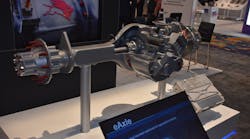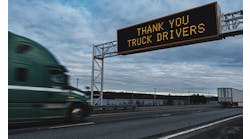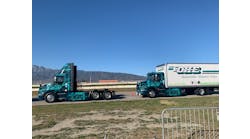Last week's Heavy Duty Aftermarket Week could be summed up in three words: electrification, automation and connectivity.
These are the same three words discussed at most trucking event these days. For those at HDAW, the focus was on how to modernize their operations to service these future vehicles once they reach their second or third owners.
That planning is taking place at manufacturers like Meritor Inc., where new product development does not go forward without sign-off from the aftermarket team, said Joe Plomin, president of aftermarket.
The company displayed one of its newest product at HDAW - the electrified axle. Plomin said it was important to give attendees a chance to see the e-axle now because “change is coming fast.”
Mike Foster, chief technology officer of Allison Transmission, said electric vehicles will have fewer total parts to replace. However, these parts will be more complex, requiring new training methods that will open more opportunities for a new generation of technicians.
“I actually view it as a big potential for suppliers,” Ken Davis said of electrification and other technologies.
Davis, founder of Greentree Advisors and previously president of Eaton Corp.’s vehicle group, said he has no doubt the internal combustion engine will be around for a very long time. Even if 20% of all vehicles in mature markets transition to electric motors, “there is still a huge market for traditional drivetrains” across the globe in emerging markets.
In the United States, Tesla, Nikola, and Thor are among the companies trying to enter the market. Even if they are successful in selling trucks, they will not be able to rely solely on a mobile fleet and software updates to service them.
“They have to work through how they are going to service commercial fleet customers,” said Davis.
Sandeep Kar, chief strategy officer of Fleet Complete, stressed the importance for maintenance shops to understand telematics. He suggested those able to reduce downtime by diagnosing problems faster can charge a premium for their work.
At the same time, aftermarket suppliers will play an important role in the logistics supply chain, even as companies like Daimler Trucks North America open new distribution centers, said Roger Nielsen, president and CEO.
“We don’t have warehouses large enough around the country to handle every configuration,” Nielsen said.
E-commerece growth in the business-to-business space is another trend pressuring the aftermarket. However, companies like Amazon face one distinct disadvantage, according to Walt Sherbourne, vice president of marketing for Dayton Parts.
“Amazon doesn’t have expertise at the counter” compared with those involved in the industry every day, he said.
Stefan Kurschner, DTNA's senior vice president of aftermarket, was a bit reserved when speaking about Amazon, saying only “it is an interesting company.”
But the fact is e-commerce options give customers more say in their purchasing decisions than in the past. And if a customer goes elsewhere, “you didn’t fulfill a need,” Kurschner said.
Yet, in the rush to react to technology, Kurschner also said there will be a certain percentage of the aftermarket that “still likes fax machines."
The result is a need to be able to “service both sides of the equation” through an improved digital platform, while still having the traditional service structure in place to be able to support the full range of customers.





